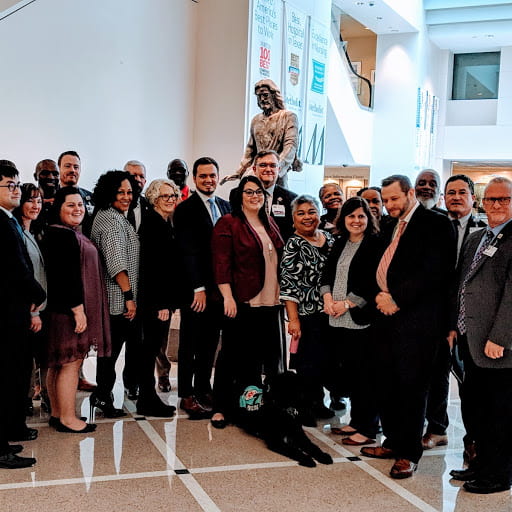In just one week, Claudia Stephens had the chance to witness the work of hospital chaplains firsthand – in the emergency room, in an oncology ward, in a long-term care facility – as they cared for people of different religious faiths, or no faith at all, representing a wide range of backgrounds and economic levels. All this happened in one short but intensive week as she participated in the 2019 Health Care Holy Care program, a January term course taught at Houston Methodist Hospital.
“This class gave me the opportunity to walk side by side with professional chaplains in the healthcare system,” said Stephens, an M.A.M. student at Perkins.
January 2021 is more than six months away, but it’s not too early to start thinking about applying to the next Health Care Holy Care. The course runs Sunday evening January 10 through Friday, January 15, 2021, and consists of daily lectures as well as immersion into the world of hospital chaplaincy.
“This course is absolutely life-changing,” said Jeanne Stevenson-Moessner, professor of Pastoral Care and Pastoral Theology, who will co-lead the course along with Dr. Robert Kidd of Houston Methodist Hospital. “It’s a unique opportunity to link practice to theology, and back to practice.”
Taking advantage of the hospital setting, students “shadow” chaplains at Houston Methodist and attend lectures on pastoral listening skills, bereavement, spiritual care, confidentiality, compassion fatigue and topics such as suffering and God’s will, or how to deal with patients who pray for miracles, or those whose religious beliefs may lead to harm. The course is open to all Perkins students regardless of their campus location but tends to attract students who have a particular interest in chaplaincy and pastoral care.
Stephens, who is also an associate professor of Costume Design at SMU’s Meadows School of the Arts, is working toward a career as a chaplain. For her, Health Care Holy Care offered valuable real-life experience.
“They teach you about verbal and body language, and how to pray and reach out to those who may not share your faith, without offending them,” she said. “I was able to observe chaplains minister to people right off the street in the emergency room. And I saw how the chaplains also reached out to the nurses, doctors and administrators, to give them pastoral care, too.”
Course leaders say participants can expect to be challenged but backed by a strong component of support. “Students are part of a cohort of up to 12 students, and the whole hospital system is incredibly supportive,” said Stevenson-Moessner.
The hospital’s welcoming culture also adds to the caring learning environment, said Dallas Gingles, associate director of the Houston-Galveston Extension Program.
“If someone is walking around looking lost, every employee in the hospital is required to ask: ‘Can I help you find your way?’” he said.
David Kim (M.Div. ‘21) attended the 2019 Health Care Holy Care program and was recently accepted into a clinical pastoral education (CPE) residency program.
“The Health Care Holy Care class at Houston Methodist Hospital was a vital step for me understanding the chaplaincy, and I still hold the experience close,” he said.
Students not only observe chaplains but also have an opportunity to try their skills in providing pastoral care to patients, under the chaplains’ supervision. After each patient visit, chaplains provide guidance and feedback.
“Yes, it was very scary, but by the third day, I knew I could do this, because these chaplains had the tools to help,” Stephens said. “As a chaplain, your role is focused on listening and observing as opposed to doing. I learned to let the Holy Spirit work through me. I would just enter the room, be loving and careful and open, and let things go where they needed to go for the good of the patient.”
Apply Early
Stevenson-Moessner encourages students to email her immediately to indicate their interest, well before J-Term registration opens in early November. Because participants will be working in the hospital, each student must undergo a fairly extensive onboarding process, including drug testing, health screening, a flu shot and a TB test, all of which must be completed by October 15.
“I’m going to shepherd any students who want to attend, to make sure they meet deadlines and don’t fall through the cracks in this process,” she said.
In addition to regular tuition charges for three credit hours, students are responsible for their own travel to and from Houston. Several courses are required, including Christian Heritage I and II, Interpretation of the Old Testament I and II, Interpretation of the New Testament I and II and Church and Social Context; however, there is the possibility of a waiver for some of those prerequisites for students with a strong interest.
The hospital provides some meals for participants and all accommodations in a nearby hotel at no cost to students. Students who live in the Houston area are required to stay in the hotel.
“We ask students to have a cellphone with them and to stay together, as they will be on call,” said Stevenson-Moessner. “You get a badge, and you are treated like an employee of the hospital for the week of the course.”
Stevenson-Moessner encourages students to contact her now.
“This is a once-in-a-lifetime experience,” she said.
Contact Dr. Jeanne Stevenson-Moessner
jmoessne@smu.edu
214-768-2433
